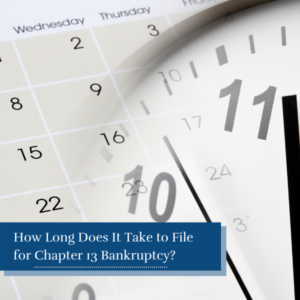Timeline for Filing Chapter 13 Bankruptcy

Bankruptcy is often seen as the worst possible outcome when facing financial difficulties. However, filing for bankruptcy can be a strategic move that helps you bring order to your financial position. When filing for bankruptcy, one of the first decisions you must make is which chapter of the Bankruptcy Code to file under.
Most individuals who file for bankruptcy will file for chapter 7 or chapter 13 bankruptcy. Occasionally it is appropriate for an individual to file chapter 11 or chapter 12. Chapter 13 bankruptcy involves making payments over a period of time not exceeding five years based on a plan confirmed by the bankruptcy court. But how long does it take to file for bankruptcy, and what is involved in filing for Chapter 13?
How Long Is the Process to File for Chapter 13 in North Carolina?
The preparation and evaluation period prior to filing a chapter 13 case ranges from hours to years. Everyone’s case is different, and it depends on what you are trying to accomplish with your chapter 13 bankruptcy. Cases that are commonly filed quickly would be to stop a vehicle repossession or to recover a repossessed vehicle. A case can be filed with a “skeletal” petition which sets for basic information and a list of creditors, or the case can be filed with all the schedules and statements and plan.
If a “skeletal” petition is filed, then the debtor is given 14 days to submit the schedules and statements. The schedules and statements require a disclosure of many items including assets, debts, budget and a statement of financial affairs which reviews prior transactions that occurred over months and years. Prior to filing a bankruptcy case, it is necessary for the debtor to take an internet based counseling course, which generally takes 45-90 minutes.
What Happens After I’ve Filed for Chapter 13 Bankruptcy?
Once you have filed your Chapter 13 bankruptcy petition in court, an automatic stay will go into effect. The automatic stay stops any collection efforts by your creditors, including foreclosure on your home, repossession of your vehicle, wage garnishment, and lawsuits. This gives you some relief from the pressure of your lenders while the bankruptcy court evaluates your petition.
From there, the process includes the following:
- Submit a repayment plan — The plan will propose a monthly payment, describe which of your debts will be paid under the plan, and detail how much your creditors will be repaid.
- Take a financial management course — You must finish the course from an approved agency before your debts can be discharged.
- Attend the meeting of creditors — You must attend a meeting of creditors, also called a 341 meeting. Presently, this meeting is done via video conference. At the meeting, you will verify your information and answer any questions.
- Have the plan confirmed — The bankruptcy court will hold a plan confirmation hearing if the trustee or any creditors object to proposed repayment plan. At the confirmation hearing, the bankruptcy court decides whether to sustain or overrule the objection. The bankruptcy court has the power to deny confirmation even in the absence of an objection. However, the bankruptcy court is only permitted to deny confirmation for a finite set of reasons set forth in section 1325 of the bankruptcy code. Confirmation generally occurs 3-9 months after the case is filed.
How Long Does Chapter 13 Last, and What Comes Next?
A Chapter 13 repayment plan lasts no more than five years from the date of plan confirmation, depending on your income and the amount of your debt. During this time, you will need to send regular payments as described by the approved plan to the bankruptcy trustee. The trustee will then distribute the money to your creditors under the plan’s terms.
As long as you comply with the terms of the plan, any balances on any debts that can be discharged left over at the end of the plan term will be discharged. You will no longer have any responsibility for those debts. However, your Chapter 13 bankruptcy will stay on your credit report for seven years after the filing date.
Contact the North Carolina Bankruptcy Attorneys at Sasser Law Firm to Handle Your Case
If you are considering filing for bankruptcy, make sure to hire an experienced lawyer to help guide you through the process. Contact Sasser Law Firm for a free, confidential consultation with one of our board-certified bankruptcy specialist attorneys today.
- About the Author
- Latest Posts
For more than 20 years, the Sasser Law Firm has been helping individuals and business owners sort through financial hardships to see the light at the end of the tunnel. Our North Carolina bankruptcy attorneys are all board-certified specialists, which means we have passed a complex exam, undergone a thorough peer review, and continue to earn legal education credits in this ever-evolving area of law.














